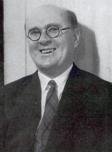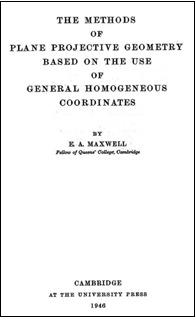 The website is in construction. New files will be uploaded as soon as they are available.
The website is in construction. New files will be uploaded as soon as they are available.
EDWIN ARTHUR MAXWELL
Aberdeen 1907 - Cambridge 1987

- Brief scientific biography
- Maxwell's work in mathematical education
- Essential bibliography
- Publications on the teaching of mathematics
Brief scientific biography
Edwin Maxwell was born in Aberdeen on 12 January 1907. After attending school and then university in his home city, he moved to Cambridge to study mathematics there. During the 19th century, and the early part of the 20th century, due to the great influence and dominance of Cambridge mathematics, it was quite common for students who had already performed well in mathematics at other British institutions to subsequently enrol for a further degree at the University of Cambridge. This is what Maxwell did.
Staying on to study for a doctorate under the supervision of H. F. Baker, he was awarded a Ph.D. in 1935 for a thesis entitled "An examination of particular surfaces with regard to their invariants". He was quickly elected to a fellowship of Queens' College, Cambridge, where he was to spend the rest of his career. During his time at Queens', Maxwell served the College in a number of different capacities, first as the Assistant Director and then the Director of Studies in mathematics, and later as Praelector, Keeper of the Records, and Junior and Senior Bursar.

His output of original mathematics was quite small, but, inspired by his work with Baker, his chief interests were largely geometrical. His main contribution was the development and use of general homogeneous coordinates in three-dimensional space. These coordinates had been originally invented, independently, by Möbius and Feuerbach in the 19th century, but in his Methods of plane projective geometry (1946) Maxwell introduced them to a British undergraduate audience. The book was explicitly written "as a study of methods and not as a catalogue of theorems; and I hope that a student reading it will have nothing to unlearn as he proceeds to apply these methods to study the geometry of figures in three dimensions or in higher space" (MAXWELL 1946, xiii).
His General homogeneous coordinates in space of three dimensions (1951) continued his work on the subject, using matrix algebra to provide clear proofs of standard results. During the 1940s and 1950s, his research-level interest in geometry gave way to the composition of originally presented geometrical textbooks such as his Geometry for advanced pupils (1949), wherein "configurations" rather than theorems are taken as the fundamental component. These geometrical textbooks were to be his most original contribution to mathematics.
Maxwell also dabbled, successfully, in writing "popular" works on mathematics. The most famous, Fallacies in mathematics (1959), successfully used humorous examples of fallacious reasoning to instill in its readers an appreciation of the importance of logical and mathematical rigour. As he wrote in the book's preface, his aim was to instruct through entertainment:
"The general theory is that a wrong idea may often be exposed more convincingly by following it to its absurd conclusion than by merely announcing the error and starting again. Thus a number of by-ways appear which, it is hoped, may amuse the professional, and help to tempt back to the subject those who thought they were losing interest." (MAXWELL 1959, 7)
After retiring from teaching in the early 1970s, he was made a Life Fellow of Queens' College in 1974. He died in Cambridge on 27 August 1987.
Maxwell's work in mathematical education
Throughout his career, Maxwell's prime mathematical activity was in the field of education. Indeed, not only did he love teaching, but "he had the gift of being able to adapt his approach to a wide range of audiences" (QUADLING 1988, 51). His skill at mathematical exposition was reflected in his production of ten textbooks for various levels, some of which have already been mentioned. In addition to several books on his special interest of geometry, he also wrote a couple on abstract algebra and An analytical calculus for school and university (1954-57), "a masterpiece of lucidity which takes the subject in four volumes from its beginnings into the realms of convergence and partial differential equations" (QUADLING 1988, 51).
As a mathematician with a keen interest in pedagogy, Maxwell was an active member of the Mathematical Association from the 1930s, becoming a frequent contributor to the Mathematical Gazette. During the 1950s, he became involved with educational developments overseas, serving on the Executive Committee of ICMI from 1952 to 1958 and as its Secretary from 1971 to 1974, under the presidency of Sir James Lighthill. He was also one of the British delegates to the 1959 conference at Royaumont, which resulted in the publication of New thinking in school mathematics (1961). An active supporter of the School Mathematics Project in its early years, an SMP book on Geometry by transformations (1975) was one of his final publications.
In 1960, he was elected President of the Mathematical Association. His presidential address, "Pastors and masters", referred to the contemporary "crisis in the teaching of mathematics" (MAXWELL 1961, 174) concerning the number of schoolteachers available to teach the subject. "In most parts of the world today there is a serious shortage of teachers," he said. "This shortage is particularly acute in mathematics, and urgent steps are necessary if the shortage is not to become catastrophic" (MAXWELL 1961, 168).
Dividing human professions into those that deal with "body", i.e. physical well-being, "mind" and "spirit", Maxwell observed that those in the first category are almost always valued higher by society than those concerned with learning or spiritual matters. The upshot, he said, was that
"twentieth-century man, with all his progress and technical achievements, has reached an attitude that will give high reward to those who look after his physical well-being, much more grudging reward to those whose concern is his mind, and, to be honest, disgracefully low reward to those who care for his spirit." (MAXWELL 1961, 170).
He acknowledged that the job-satisfaction of many teachers is completely independent of financial remuneration, and that those entering the profession are well aware that they could earn more money in other jobs of comparable difficulty. But, he said, "that is no reason why the community should not face its own responsibilities and insist that its pastors and masters are properly looked after" (MAXWELL 1961, 170). This message, together with his overall theme, "the worthwhile-ness of teaching and the proper status of the profession" (MAXWELL 1961, 174), remains as compelling today as when it was first delivered.
Maxwell's work for the Mathematical Association also included a term as editor of the Mathematical Gazette between 1963 and 1971, during which time "the journal earned a reputation for lively and relevant articles, and a view that mathematics could be serious without being solemn" (QUADLING 1988, 52). He also took over as the Mathematical Association's treasurer in 1976, when the previous incumbent died suddenly, serving in that position for three years. So strong was his affection for the Association that he even donated some of the royalties from his book on Fallacies in mathematics in "gratitude for much that I have learned and for many friendships that I have made" (QUADLING 1988, 52).
Essential bibliography
E.A. MAXWELL 1946, The methods of plane projective geometry based on the use of general homogenous coordinates, Cambridge, Cambridge University Press
E.A. MAXWELL 1949, Geometry for advanced pupils, London, Clarendon Press
E.A. MAXWELL 1951, General homogeneous coordinates in space of three dimensions, Cambridge, Cambridge University Press
E.A. MAXWELL 1954-1957, An analytical calculus for school and university, 4 vols., Cambridge, Cambridge University Press
E.A. MAXWELL 1965, A gateway to abstract mathematics, Cambridge, Cambridge University Press
E.A. MAXWELL 1965, Algebraic structure and matrices, Cambridge, Cambridge University Press
E.A. MAXWELL 1975, Geometry by transformations, Cambridge, Cambridge University Press
D. QUADLING 1988, Edwin Arthur Maxwell, The Mathematical Gazette, 72, 51-52
Publications on the teaching of mathematics
E.A. MAXWELL 1959, Fallacies in mathematics, Cambridge, Cambridge University Press
E.A. MAXWELL 1961, Pastors and masters, The Mathematical Gazette, 45, 167-174
Author
Adrian Rice
Randolph-Macon College, Ashland, Virginia
arice4@rmc.edu
